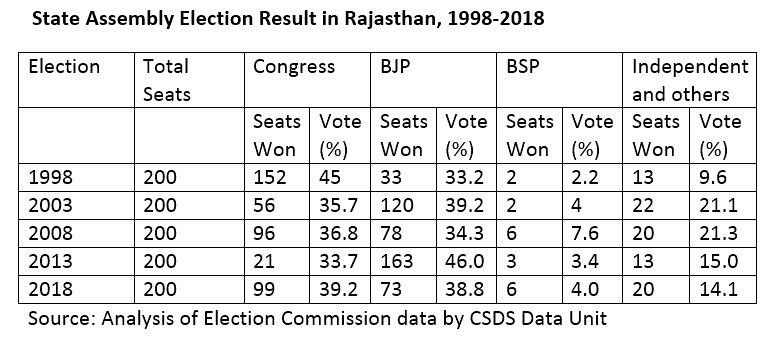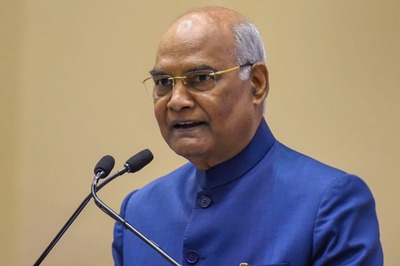
views
The outcome of the 15th Vidhan Sabha elections in the state of Rajasthan has once again brought the Congress at the helm of affairs. Winning 99 seats, the Congress achieved a major gain of 78 places over its 2013 debacle.
One seat was won by party’s ally, the Rashtriya Lok Dal. The party thus secured a majority with the support of its ally. The Congress has retained 16 of the 21 seats it had won in 2013 and it has wrested 76 seats from the BJP and seven seats from others.
In the aftermath of the elections, Congress has the support of nine independent winners who fought as ‘rebels’ on being denied the Congress symbol. Six winners from the BSP and two from the CPM have also promised support to the Congress government which will take oath on 17th December.
Thus, the Congress now has the support of 117 members in a Legislative Assembly which has a maximum strength of 200. Election to one constituency was deferred due to the death of a BSP candidate.
The BJP, which had secured an unprecedented verdict in 2013 winning in 163 constituencies, suffered a major reverse losing in ninety places and ending up with a tally of 73 seats only.
The defeat of many senior ministers of Vasundhra Raje government viz. Yunus Khan, Rajpal Singh Shekhawat, Prabhulal Saini, Shreechand Kriplani, Arun Chaturvedi, Gajendra Singh Khinvsar and Rao Rajendra Singh reflect the magnitude of the loss. Even the Chief Minister herself faced a tough fight from Manvendra Singh, son of Jaswant Singh one of the founders of the BJP, who deserted the BJP to join the Congress just before the elections. In 65 of the 73 seats that the BJP won, Congress occupied the second position.
The newly formed Rashtriya Loktantrik Party and the Bharatiya Tribal Party registered victories in three and two seats, respectively. Four independent candidates were also successful in winning. It was interesting to see that except for the Congress rebel in the reserved seat of Kushalgarh (ST), all other winning candidates belonging to non-Congress and non-BJP political parties or independents secured 20-30 per cent votes.
The table below shows a peculiar feature of electoral politics in Rajasthan. Over the last two decades, five Assembly elections have been held in the state. The outcome of each of these elections has led to a change of party in power.
The ‘revolving door’ outcome has been equally shared by the Congress and the BJP. Competitive electoral politics has become increasingly bipolar in the state.
The BSP has become a regular feature in the state garnering about four per cent votes and a few seats. Other than the BSP and the Left parties, all other parties have been ephemeral in nature.
Playing the role of ‘spoilers’ in one election, these outfits vanish by the next election. The ‘independents’ are mostly ‘rebels’ of BJP or Congress who normally rejoin the parent party after some nominal action. What this implies is that although the number of political parties, registered and unregistered, is high in each election, there are only a few ‘effective’ parties. More than 80 per cent votes and seats are shared between the Congress and the BJP.

Why Did the BJP Lose?
After the resounding BJP victory in 2013 Assembly and 2014 Lok Sabha elections, it was being felt that from now onwards Rajasthan will also follow the path taken by its neighboring states such as Gujarat, Madhya Pradesh and even Chhattisgarh.
In these states, the BJP had been in saddle for three or more than three elections. But this did not happen. Very early in its office, the BJP government started to dither. The party lost three of the four Assembly bye-elections held in 2014 and could not do well in the elections held for the local self-government institutions, both in rural and urban areas in 2015.
Early in 2018, the BJP again performed badly losing two Lok Sabha and one Assembly bye-elections. Thus, dissatisfaction with the state government started building up soon and got deeper as years started unfolding. This negative sentiment emerged because of two major reasons: perception of non-performance and corruption.
The Raje government had initiated a slew of welfare schemes in the state but there was poor delivery of the benefits. Rampant unemployment, price rise, inadequate access to drinking water, lack of development and insufficient access to health, education and transportation left the people in a miserable condition.
The peasantry was also deeply dissatisfied with the government because of its callous attitude. Strong perception of corruption further led to a seething anger. Thus, as the stage for the 15th State Assembly elections in December 2018 was being prepared, a common sentiment which was being expressed was that Rajasthan will once again follow the previous trend of circulation of the ruling party and power will come back to the Congress.
The Unsatisfying Congress Victory
In the months preceding the election, the strong anti-incumbency against the BJP government gave the impression that the Congress will attain a comfortable win in the state. But this did not happen as seen above.
The party has secured a bare majority. How does one explain this below par performance of the Congress? A number of reasons converge to explain this.
The initial parleys with the BSP gave the impression that the Congress is not confident about its victory. Due to the unreasonable demands of the BSP, the alliance became implausible for the Congress.
Finally, the party ceded 5 seats to RLD, JD (S) and the NCP. Of these, four were lost. Another reason which can be cited is the delay in distributing party tickets. Many prospective candidates were extremely unhappy with the official party candidates. Some of the disgruntled contested as ‘rebels’ and also won.
In some places, the dissatisfied worked against the official candidate and ensured their loss. A few others just kept aloof from the whole process to show their resentment. Delay in declaration of election manifesto also harmed the prospects of the party.
One final factor which needs to be mentioned here is the choice of the Congress not to declare its chief ministerial candidate. This issue kept on dogging the party all throughout the campaign. There was a strong perception that if Ashok Gehlot had been declared as the party’s chief ministerial candidate, the result would have been better for the Congress.
Gazing Forward
All this is past now. The Congress has won and Ashok Gehlot has been declared as the Chief Minister for the third time. Sachin Pilot will be his deputy. The swearing-in ceremony will be held on 17th December in the presence of the party President Rahul Gandhi and leaders of a host of other political parties who are going to be a part of the Congress-led ‘mahagathbandhan’ (Grand Alliance) for the forthcoming General elections. Not much time is left for the new government before code of conduct for these election come into play.
The ‘iron law’ of electoral democracy in India has been that if two major elections are held close to each other, the outcome of one affects the succeeding election. If this pattern continues, the Congress is likely to perform well in the Lok Sabha elections. But nothing can be taken for granted. From now onwards till the summer of 2019, it is going to be an uphill task for the Ashok Gehlot-led Congress government. The magician that Gehlot is, he has to neutralize the ‘Modi magic’.
(Sanjay Lodha is the Head of Political Science Department in Mohanlal Sukhadia University. Views expressed are personal.)




















Comments
0 comment